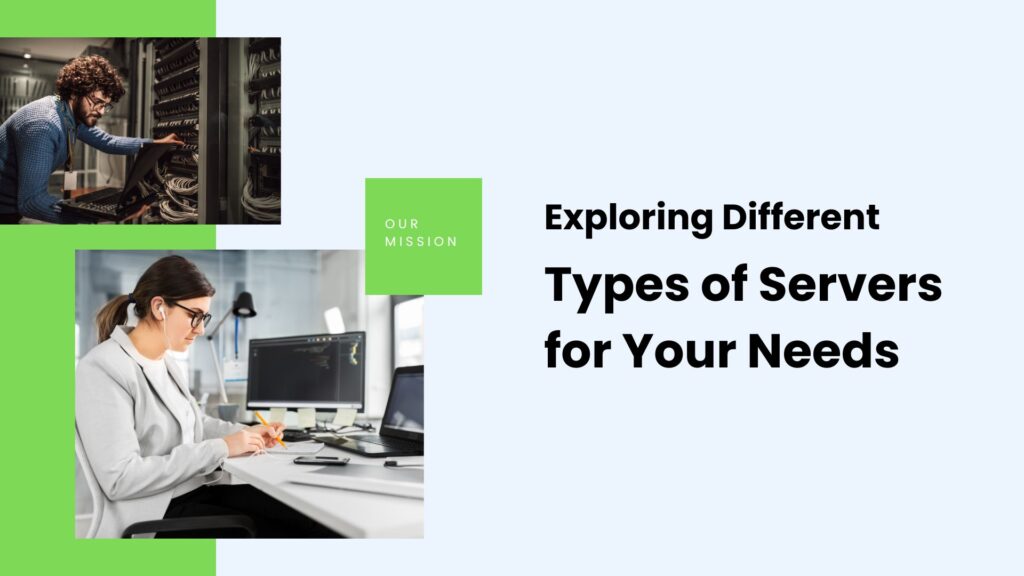
A Guide to Understanding Various Types of Servers for Your Requirements
Introduction to Servers
Servers are the backbone of the digital world, playing a crucial role in enabling the functioning of businesses, websites, and applications. Understanding the different types of servers available is essential for making informed decisions when it comes to choosing the right server for your specific requirements.
What is a Server?
A server is a computer or software program that provides functionality for other devices or programs, known as clients. It serves data, resources, or functions to multiple clients, enabling them to access and utilize these services efficiently.
Importance of Servers in the Digital Age
In today’s digital age, servers are essential for storing, managing, and distributing data across networks. They facilitate communication, collaboration, and information sharing, making them indispensable for businesses of all sizes.
Understanding the Role of Servers in Different Businesses
Servers play a diverse range of roles in various businesses, from hosting websites to managing databases and providing email services. Understanding how servers function within different business contexts is crucial for optimizing their performance and ensuring seamless operations.
Types of Servers Based on Functionality
Web Servers
Web servers are designed to host websites and deliver web content to users. They are responsible for processing and responding to client requests, serving web pages, and managing website resources effectively.
- Definition and Purpose of Web Servers: Web servers are specialized servers that store and serve web content like HTML, CSS, and multimedia files to users.
- Examples of Popular Web Servers: Apache, Nginx, Microsoft IIS
- Features and Benefits of Using Web Servers: Scalability, performance optimization, security features
File Servers
File servers are dedicated to storing and sharing files within a network, allowing users to access and manage data from a centralized location. They facilitate file storage, backup, and retrieval processes efficiently.
- Explanation and Uses of File Servers: File servers support file storage, sharing, and collaboration among users within an organization.
- Key Features of File Servers: File access controls, data encryption, data deduplication
- Advantages of File Servers for Data Storage and Sharing: Centralized data management, data redundancy, simplified data access
Application Servers
Application servers provide a platform for running and managing business applications, ensuring seamless interaction between clients and servers. They support the deployment, execution, and maintenance of enterprise applications.
- Overview of Application Servers: Application servers host and deliver business applications to end-users, streamlining application deployment processes.
- Functions and Capabilities of Application Servers: Load balancing, session management, database integration
- Importance of Application Servers in Running Business Applications: Enhanced performance, scalability, fault tolerance
Types of Servers Based on Technology
Virtual Servers
Virtual servers are software-based servers that run on a virtualized environment, allowing multiple virtual machines to operate on a single physical server. They offer flexibility, scalability, and cost-effectiveness for hosting different applications and services.
- Definition and Concept of Virtual Servers: Virtual servers emulate physical servers, enabling resource isolation and optimized server utilization.
- Advantages of Using Virtual Servers: Resource efficiency, rapid provisioning, disaster recovery capabilities
- Factors to Consider When Choosing Virtual Servers: Performance requirements, scalability options, security measures
Dedicated Servers
Dedicated servers are physical servers exclusively allocated to one client, providing dedicated resources and enhanced performance for hosting applications or websites. They offer greater control, security, and customization options compared to shared hosting solutions.
- Explanation and Benefits of Dedicated Servers: Dedicated servers offer dedicated resources, improved security, and better performance for demanding workloads.
- Features of Dedicated Servers for Enhanced Performance: Hardware customization, high-speed connectivity, remote management tools
- Considerations Before Opting for Dedicated Servers: Budget constraints, technical expertise, scalability requirements
Cloud Servers
Cloud servers operate on a cloud computing infrastructure, utilizing resources from multiple servers in a virtualized environment. They offer scalability, flexibility, and cost-efficiency for hosting applications and services in the cloud.
- What Are Cloud Servers and How Do They Work? Cloud servers leverage virtualization technology to provision resources on-demand, delivering services over the internet.
- Advantages of Cloud Servers Over Traditional Servers: Resource scalability, pay-as-you-go pricing, global accessibility
- Best Practices for Utilizing Cloud Servers Effectively: Resource optimization, security configurations, monitoring and management tools
Hybrid Servers and Their Applications
Hybrid servers combine aspects of dedicated and cloud servers, offering a hybrid hosting solution that leverages both on-premises and cloud-based resources. They enable businesses to achieve a balance between performance, flexibility, and cost-efficiency.
- Definition and Characteristics of Hybrid Servers: Hybrid servers integrate on-premises and cloud resources to provide a versatile hosting solution.
- Reasons for Choosing Hybrid Servers: Customizable configurations, workload optimization, cost-effective scalability
- Examples of Hybrid Server Configurations and Use Cases: Hybrid storage solutions, hybrid cloud environments, disaster recovery strategies
Conclusion
In conclusion, the diverse range of servers available cater to different requirements and preferences, offering businesses and individuals a wide array of options to choose from. Selecting the right server type depends on various factors like performance needs, budget constraints, and scalability requirements.
- Summary of Different Types of Servers and Their Purposes: Web servers for hosting websites, file servers for data storage, application servers for running business applications, virtual, dedicated, cloud, and hybrid servers for varied hosting needs.
- Factors to Consider When Selecting the Right Server for Your Needs: Performance requirements, scalability options, security measures
- Importance of Regular Maintenance and Upgrades for Optimal Server Performance: Ensuring server security, enhancing performance, optimizing resource utilization
FAQs
What type of server is best suited for a small business?
The best server type for a small business depends on the specific requirements and budget constraints. Virtual servers or cloud servers are cost-effective solutions for startups and small businesses.
How can I ensure the security of my server?
To ensure server security, implement regular security updates, use strong passwords, configure firewalls, and monitor server activity for any suspicious behavior.
